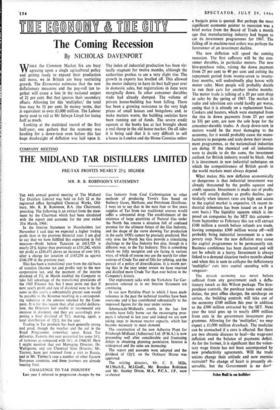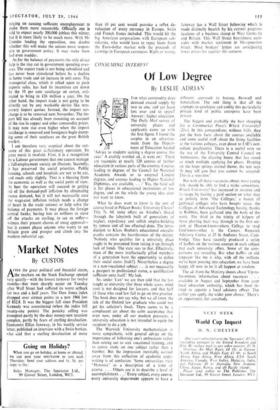The Coming Recession
'FR 1E BOTCHY A HE OM
By NICHOLAS DAVENPORT
Looking at the statistical record of the first half-year, one gathers that the economy was heading for a down-turn even before this last huge deadweight of deflation was laid upon it. The index of industrial production has been vir- tually stagnant for twelve months, although the authorities profess to see a very slight rise. The growth in exports has levelled off. This allowed the motor industry to have its best half-year ever in domestic sales, but registrations in June were marginally down. In other consumer durables trade had already slumped. The volume of private house-building has been falling. There has been a growing resistance to the very high prices of small houses and bungalows and, to make matters worse, the building societies have been running out of funds. The severe credit squeeze at the banks has at last brought about a real slump in the old house market. On all sides it is being said that it is very difficult to sell a house in London and the Home Counties unless a bargain price is quoted. But perhaps the most significant economic pointer to recession was a brief notice from the Board of Trade a month ago that manufacturing industry had begun to cut its investment programmes for 1967. The falling off in machine-tool orders was perhaps the forerunner of an investment decline.
The new deflation will speed the coming recession. The first sufferers will be the con- sumer durables, in particular motors. The new hire-purchase rules, raising the down payment from 25 per cent to 40 per cent and cutting the repayment period from twenty-seven to twenty- four months, will undoubtedly play havoc with motor sales. Most people will probably decide to run their cars for another twelve months. The motor trade is talking of a 20 per cent drop in sales by the spring of 1967. The market in radio and television sets could hardly get worse, seeing that it is already on a replacement basis. Cookers and heaters, which were exempted from the rise in down payments from 25 per cent to 334- per cent, are now the sole hope for the consumer-durable trades. A sharp down-turn in motors would be the most damaging to the economy, for it would probably cause the manu- facturers to postpone and scale down their invest- ment programmes, as the nationalised industries are doing. If the chemical and oil industries were to decide to do the same, the investment outlook for British industry would be bleak. And it is investment in new industrial techniques on which the competitiveness of British goods in the world markets must always depend.
What makes this new deflation economically so dangerous is that industrial investment was already threatened by the profits squeeze and credit squeeze. Investment is made out of profits and will usually decline as profits decline, par- ticularly when interest rates are high and access to the capital market is expensive. (A recent in- dustrial debenture has been issued on an 8 per cent basis.) The liquidity squeeze which is im- posed on companies by the SET this autumn— from September to February this tax will extract £100 million a month before refunds are made, leaving companies £300 million worse off—will probably bring industrial investment to a tem- porary stop. Now the new deflation may cause the capital programmes to be permanently cut. Business confidence has been shattered and will not be rebuilt in a hurry. Investment is always linked to a demand situation twelve months ahead and when this is seen to collapse the deflationary 'multiplier' cuts into capital spending with a vengeance The tin tish economy nas never before suffered from any government such a defla- tionary knock as this Wilson package. The hire- purchase controls, the purchase taxes and excise duties, the post office charges, the surcharge on surtax, the building controls will take out of the economy £340 million this year in addition to the £300 million extracted by the SET. Next year the total goes up to nearly £800 million from cuts in the government investment pro- grammes. Allowing for the 'multiplier,' we may expect a £1,000 million drawback. The medicine can be stomached if a cure is effected. But there are two chronic diseases to heal—the wage-cost inflation and the balance of payments deficit. As for the former, it is significant that the volun- tary wage freeze has not been accompanied by new productivity agreements. Will the trade unions change their attitude and now exercise restraint? No change of heart is presently ob- servable, but the Government is no doll'.
John Bull is on holiday relying on causing sufficient unemployment to make them more reasonable. Officially one is told to expect nearly 500,000 jobless this winter, but it is more likely to be much more. With Mr ' Cousins leading the opposition, one doubts whether this will make the unions more respon- sive to government policy. It may make them feel even madder.
As for the balance of payments the only direct help is the tiny cut in government spending over- seas. The export trade is not being subsidised and has never been stimulated before by a decline in home trade and an increase in unit costs. The managerial class, which is relied upon to push exports sales, has had its incentives cut down by the 10 per cent surcharge on surtax, esti- mated to bring in f26 million a year. On the other hand, the import trade is not going to be directly cut by any workable device like tem- porary import quotas. Instead, the import sur- charge is to be removed next November. The im- port bill has already been mounting on account of the rise in copper and other commodity prices. It may now rise even higher when the import surcharge is removed and foreigners begin dump- ing some of their surpluses on the great British market.
I am therefore very sceptical about the out- come of this great deflationary operation. Its great merit is twofold. First, it is a recognition by a Labour government that one cannot manage a full-employment society on illusions. Secondly, it has preserved the social priorities. Public housing, schools and hospitals are not to be cut, and roads only slightly. That is a blessing from the economic as well as the social point of view. At best the operation will succeed in getting rid of the demand-pull inflation by eliminating excess demand, but it will not necessarily cure the wage-cost inflation (which needs a change of heart in the trade unions) or help solve the balance of payments. It may please the foreign central banks, having lent us millions to stave off the attacks on sterling, to see us suffer— witness their present chorus of smug approval— but it cannot please anyone who wants to see Britain grow and prosper and climb into the modern industrial age.































 Previous page
Previous page